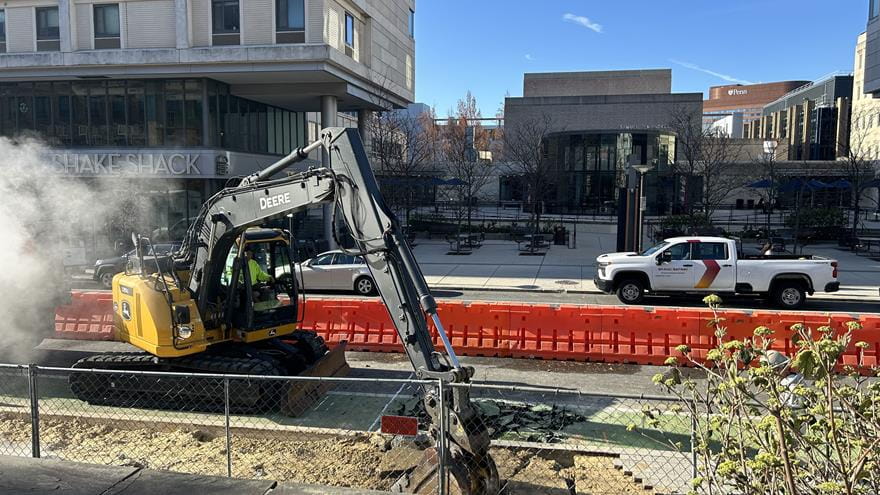The Right Fit: Formal Fall Recruitment for Drexel Sororities and Fraternities Goes Hybrid

Maggie Higgins, a fifth-year architectural engineering student and a sister in the Phi Sigma Sigma sorority at Drexel University, is still a bit mystified about the recruitment process for Drexel’s five Panhellenic Council (PHC) sorority chapters. This is even after aiding that process as a recruitment counselor for the last three years.
“I remember always thinking it’s three times you’re meeting a chapter. How can you pick to join that chapter for the rest of your college career?” she said. “But it always works out.”
That notion that the process always works out in the end was tested over the course of the pandemic. In Fall 2020, all of Drexel’s more than 30 chapters of Panhellenic sororities, Interfraternity Council (IFC) fraternities, and Intercultural Greek Council (IGC) organizations, held recruitment fully virtual. This fall, with the return of students to in-person learning, many went forward with a hybrid model.
The question was, would it still “work out” for students to make these Drexel-long or even lifelong friendships not through a few visits to the chapter house, but partially or fully through the computer screen?
“Online, I was very skeptical, but I do feel like all the girls feel like they fit,” Higgins said of last year’s virtual Panhellenic recruitment model. She added of this year: “I hope the girls feel like they’re getting the full experience because that’s the biggest deal.”
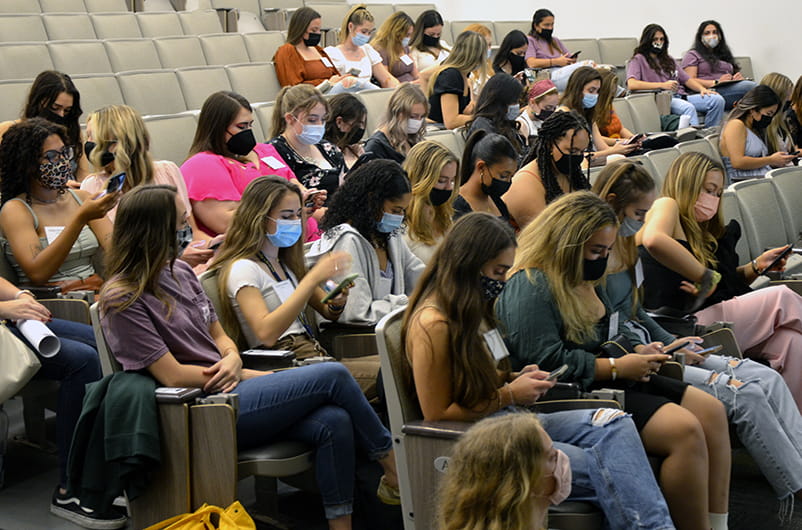
The sorority recruitment process returning to some semblance of normalcy this term with in-person, masked events was, in fact, a big deal to the new members going through it. The process unfolded in three rounds from Oct. 6 through Oct. 9, with one asynchronous virtual introductory round where both chapters and potential new members (PNMs) shared videos explaining the ins and outs of their organizations or of themselves. On the evening of Oct. 8, the PNMs met with up to four chapters in-person to have in-depth conversations and get a feel for their potential home away from home for the rest of their college career.
“I’m super excited because I was virtual all last year,” said Kira Daubert, a second-year psychology major going through recruitment, before the Oct. 8 round two meetings began. “I wasn’t able to have any on-campus opportunities, so I feel like this will be a great way to meet people since I wasn’t really able to meet people besides through Zoom meetings, which isn’t very ideal. So, I’m just excited for that and hopefully finding my home.”
“Right now I’m super nervous and stressed out, but I’m very excited at the same time,” added Laura Jennings, a first-year exploratory studies student also participating in recruitment. “I just want to go meet everyone. There’s only so much you can see off of the videos and Zoom calls [during round one], and I already got great first impressions, so I’m just excited to actually meet them in person and have those impressions grow.”
The large lecture room on the first floor of Nesbitt Hall — where PNMs, recruitment counselors and Panhellenic leadership all met and debriefed before each in-person round of recruitment — was buzzing with the same excitement and nerves the night of Oct. 8.
Alexa Knapp, a fourth-year management information systems and business analytics student and president of Drexel’s Panhellenic Counsel, shared her own anticipation for the first in-person recruitment event since she herself was a potential new member in 2019. Despite this, she admitted she also knows it’s an overwhelming and perhaps “scary” process.
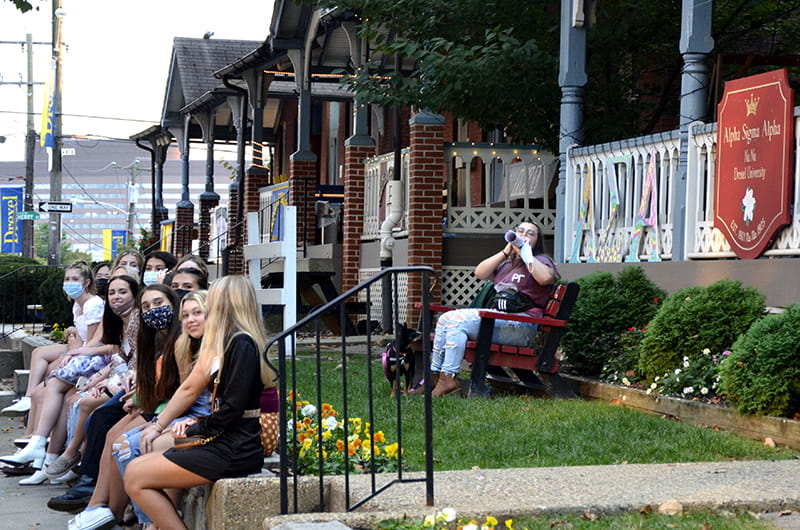
But right away as they started walking toward their first chapter meetings, something was happening that helped put girls’ nerves at ease — something that might not happen as naturally over Zoom. The PNMs and recruitment counselors (nicknamed “Rho Gammas” as they do not share their sorority affiliation until the process is over) alike filled the void with meaningful conversation and encouragement.
“It’s good, you just gotta be yourself. Your vibe is not a crime,” one Rho Gamma said to quell the fears of an anxious PNM while another lined them up in front of the Delta Phi Epsilon house on N. 34th Street.
Daubert was part of the queue, about to embark on something she never thought she’d want to do back in high school. But after living at home and missing out on a normal freshman year of college due to the pandemic, she figured she might as well go for it. She was anxious to get inside what she hoped would be the sorority chapter that accepted her.
“I wish we didn’t have to wait to find out,” she admitted.
Minutes before it was time to file in, the sisters inside started cheering and chanting, psyching themselves up to welcome their guests. A few moments later, it happened again. Then, they erupted into one of their official chants as they welcomed inside the potential new members.
“I feel like it just raised the entire mood,” Daubert said of this exuberant welcome. “It made me want to actually go in and join them and have the conversations and find out more.”
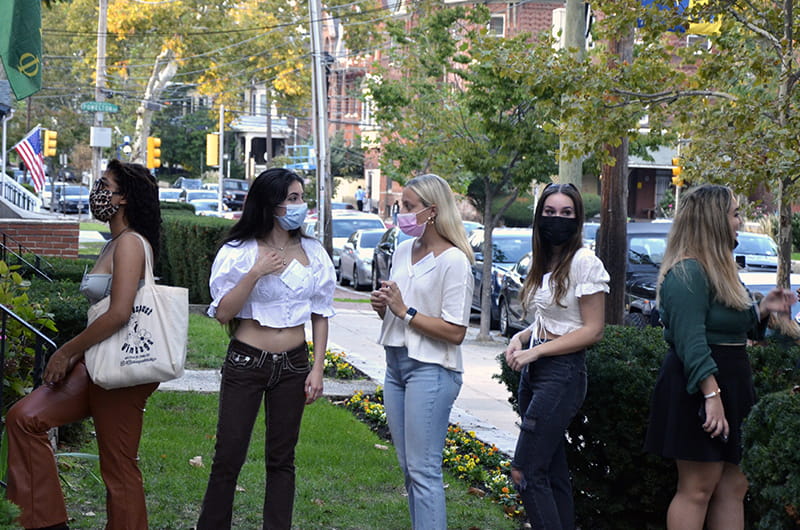
For Daubert, visiting the chapters in person was everything, as she feels it’s easier to talk one-on-one to find out who people truly are.
“I felt like I could have real conversations and make genuine connections with them,” she said. “I also like talking so it wasn’t really that nerve-wracking for me, but I think it was really nerve-wracking in the sense that I really want to be in this sorority.”
Following this second round, though the first in person, was the preference event on the evening of Oct. 9. This was when potential new members visited only up to two chapters and underwent a ritual, with the hope that they’d leave knowing which chapter they’d like to join. They made this selection or ranked their two preferred sororities in order, and the following day those that receive bids were welcomed with open arms into their new sisterhoods with the dancing, music, costumes and revelry of Bid Day. This was a big change as compared to last year, when all of the coming together to celebrate had to happen as the sisters remained apart.
“I don’t think anyone really wound up at the wrong place last year, but I think that it’s just going to feel so much more secure for a lot of the PNMs and also just more exciting for the chapters,” Maya Grinberg, a fourth-year fashion design major in the Alpha Sigma Alpha sorority who was a Rho Gamma this year, said of this change.
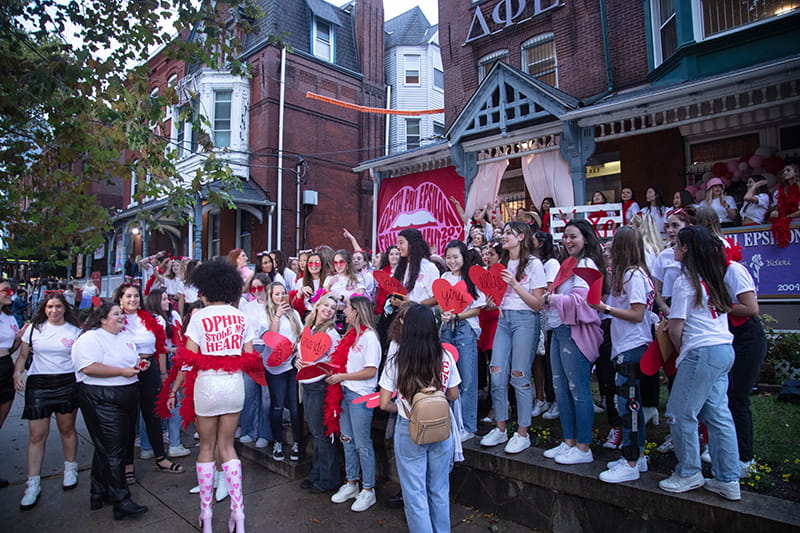
Grinberg added that she participated in recruitment with her chapter last year as opposed to being a Rho Gamma, and found that Zoom fatigue and talking through screens made some of the PNMs seem like they were closed off. Emma Casey, a fifth-year communications major in Delta Zeta, said this distance carried on even as new recruits became members in her sorority.
“I do think they lost a lot of the experience of being with each other in those meetings and really getting to know each other,” Casey said. “I think they missed out on a lot of the bonding that comes with actually hanging out and having side conversations and getting off track.”
Casey added that she believes her chapter planned to continue having in-person, masked events with the new pledge class at the chapter house this year to give them more of these opportunities to bond.
“I really hope that works out for the best for them. I really got the most out of my new member experience by being able to have those one-off conversations or going and grabbing pizza after our new member meeting,” she said. “It was probably my most valuable time in my sorority experience as a whole so I hope they get that.”
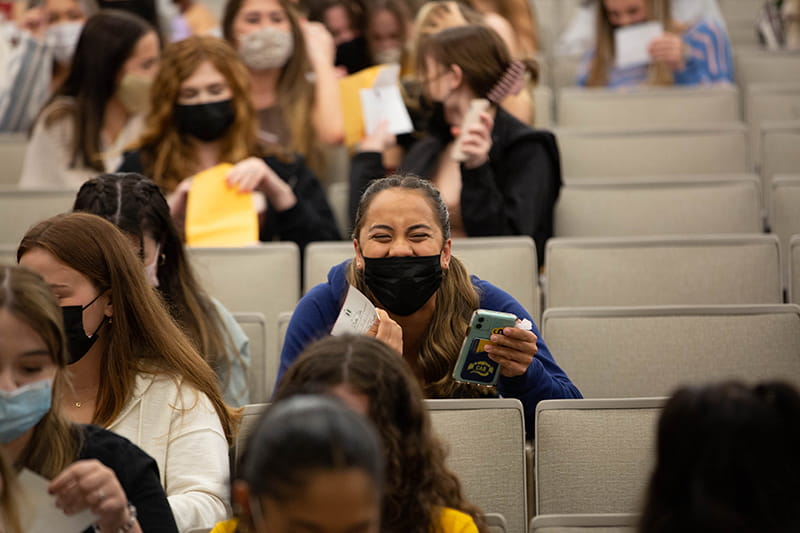
The opening of their bid cards the evening of Oct. 10 jumpstarted this valuable experience for this term’s crop of new sisters. They then gathered by new pledge class for each of the five chapters, left Nesbitt Hall and walked — or sometimes ran — to embrace their new sisters waiting to greet them near the Northside Dining Terrace. Screams, chants and music echoed throughout this residential part of campus, and carried on as sisters migrated to their chapter houses and got to know each other better.
“When we were able to hang at the house, it just felt like the perfect fit and it definitely emphasized that I made the right decision,” said Daubert about Bid Day after receiving a bid from Delta Phi Epsilon.
Todd Sullivan, director of Fraternity and Sorority Life, said he was pleased with how the student leaders of both the Panhellenic Council and the Interfraternity Council organized their formal recruitment processes this year, as well as IGC organizations which conduct informal membership intake at various points throughout the year.
“In this year’s hybrid format, it was important to balance safety with access,” he said. “Students were both hesitant and excited to be together. Switching from screens to in-person events, behind masks, may have been an awkward transition. Yet it allowed for a cautious re-entry that did not expose hundreds of students to unnecessary risks.”
Drexel Interfraternity Council President Tyler White, a fifth-year operations and supply chain major, said he believes this year’s recruitment process was more inviting and beneficial for both the brothers and potential new members.
“Being able to have an in-person interaction creates a better sense of community and personal association with the values an individual might possess,” he said. “The pandemic still did hinder this most recent recruitment process as some events had to become virtual events or not be done at all due to guidelines. But compared to last year's fully virtual recruitment process, we saw a great turn out and chapters responded well to the changes as well as welcomed the opportunity to be back in person.”
Sullivan points out that there were actually more women who joined Panhellenic sororities in fall 2020 (113) than in fall 2021 (85). It is unclear if there was a similar trend in the IFC as some fraternities did not recruit in fall 2020, though they did welcome 140 new brothers this year.
“The barrier to entry was lower last year. The registration fee was less, and potential new members could sign on from anywhere and simply close their laptop after each event,” Sullivan said, speculating reasons for this PHC year-over-year trend. “This year, in an effort to return to a sense of normal, we had some in-person events. In some ways, it may have been easier to stay fully remote or go fully in person. Although we chose the hybrid approach trying to balance safety with access, this middle ground may have been confusing to some people from a logistics or sociological perspective.”
“We went into this with anecdotal evidence from other schools that the hybrid format tended to have a lower retention rate than either the fully in-person or fully virtual structures,” Knapp added on this topic. “Furthermore, the addition of the in-person aspect was bound to cause some hesitation in sign-ups — most of us haven’t been in large social situations since March 2020 so of course that would be produce some anxiety! However, nothing really captures the excitement of recruitment quite like in-person does.”
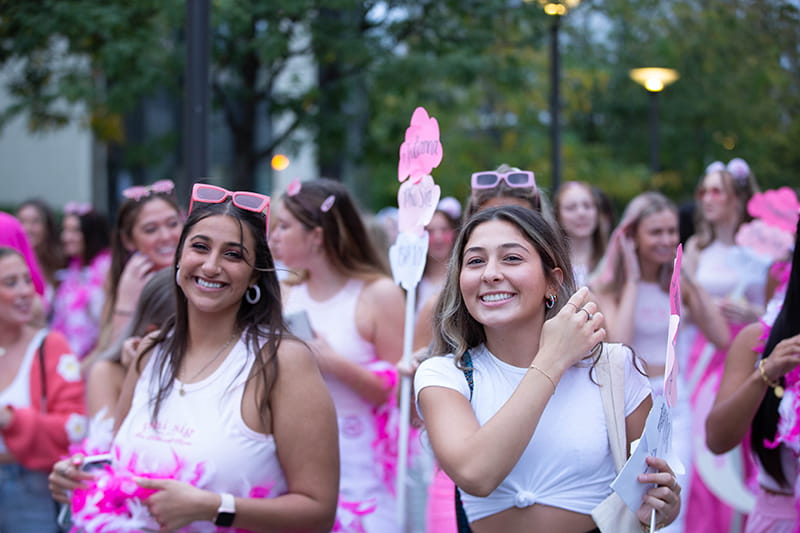
Zuleyha Kumas, a second-year finance student who accepted a bid with Phi Sigma Sigma, decided to forgo recruitment last year due to it being virtual. After taking part in the hybrid-process, she was still happy with her decision as well as where she ended up.
“Being in that environment made me feel better about my next four years here, knowing I have that group of girls I can go to whenever I need something or just a safe place,” Kumas said. “People say ‘home away from home,’ but that really is true and kind of gives you a reason to want to stay here and not get homesick. … Even if the pandemic does get in the way of some things, I don’t really mind that really because I now have those people I can go through it with.”
Jennings joined Delta Zeta alongside her roommate Katie Prikril, a first-year global public health major. Through elements like masking and a virtual round one for both new sisters to get through, they were also happy to go through the process in person despite the ongoing pandemic.
“I think Greek life as a whole is really inclusive and all about getting to know new girls, which is what I’m really excited for,” Prikril said. “I’m happy to be able to participate in years to come with making girls feel like they found a place where they really fit in.”
In This Article
Drexel News is produced by
University Marketing and Communications.

